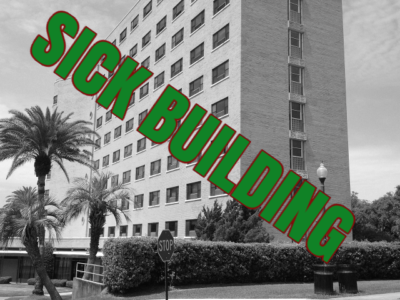The residents of Smith Hall have all been royally f**ked. There’s a mold epidemic in the dorm and FSU knew about it for years, yet did done nothing to prevent the spread of the fungus beyond renting out a limited number of dehumidifiers. Now it reached a breaking point. Forget about your moldy pair of shoes, it is time to act.
FSU’s official statement on the matter reads: “We had a mold problem in one of our oldest residence halls that had been closed for three weeks in warm, rainy weather during the winter break. As soon as it reopened, housing staff immediately began working with students to resolve the problem, clean their rooms and repair any damaged items. The university’s Environmental Health & Safety Department followed up, checking the entire hall and deemed it safe.”
Yet because Smith Hall is deemed “safe” and habitable, FSU’s holds no legal obligation towards its students. In fact, by offering to clean all damaged property, the university went beyond the law’s requirements. However, that doesn’t mean that we, as a student body unified in our disgust of the situation, cannot hold our university to a higher standard.
It’s also concerning that FSU has yet to release additional details about the extent of the mold damage in Smith. The type and extent of damage of the mold remains unknown until a third party expert comes in to examine the building.
Another problem is that there is no set standard on how much mold it takes to make a building uninhabitable or to make a person sick. The examiner’s judgment on the state of the building comes from many factors, including the size of the room, the building’s ventilation and the concentration of mold in the air. The really screwed up part is the examiners that already inspected the building are on FSU salary. Once again, until independent examiners conduct their own tests, nothing further can be established.
One freshman’s story describes the full extent of the mold problem at Smith Hall. Florida State University freshman Carly Herrera fell victim not only to property damage, but also of health complications resulting from the mold. After moving to Smith Hall, Herrera experienced complications. “I began getting symptoms of a cold all the time. I thought I may be having allergies or getting a cold but it became constant,” Herrera said.
Doctors at the University Health and Wellness center diagnosed her with strep throat twice, but soon she developed a thick mucus that clogged her nose, which isn’t a symptom of strep throat.
After leaving the dorm for an extended period of time, Herrera’s symptoms vanished and she figured out that the culprit was something in her room. “Once I got back, I had to use a facemask because of the mold and smell.” Herrera currently lives in her friends’ dorms to avoid sleeping in a mold-infested building.
The worst part is that Herrera missed school because of the illnesses resulting from the mold.
Herrera petitioned for a room reassignment through University Housing, but her health appeal is still being processed. Little doubt to the legitimacy of Herrera’s medical claim exists.
According to the The Center for Disease Control, “there is sufficient evidence to link indoor exposure to mold with upper respiratory tract symptoms, cough[ing], and wheeze[ing] in otherwise healthy people.” Herrera presents a concrete example of these symptoms.
Unfortunately, FSU doesn’t want to change its tune. The university even changed its 2016-2017 housing contract. The new condition makes residents responsible for the prevention of mold and mildew, including over breaks, exempting FSU from the responsibility of cleaning or replacing all of your belongings covered in yeti fur.
Two solutions exist to prevent mold. The first: Run a dehumidifier for a good chunk of the day, every day and empty it daily. The second solution involves DampRid or a similar moisture control product, but you must replace these very often in humid environments. Neither of these solutions will work over winter break, so enjoy cleaning your moldy clothes.
The conditions in Smith Hall remain unacceptable on both an education and health level. It’s more than the exorbitant amount of money that students pay to live here; our focus should be on classes, not scrubbing down our walls every night.
Many students work to pay for school and shouldn’t have to sacrifice that income to keep their living spaces free of mold. Worst of all, students shouldn’t miss class because of illnesses resulting from the university’s negligence.
The World Health Organization states “healthy indoor air is recognized as a basic right.” Excess mold or dampness deprives people of healthy air.
Our human rights shouldn’t be denied to us. A mold problem can occur in any on-campus housing facility, so all FSU students need to learn how to prevent similar situations. We need to tell our school that we expect more from them. Even if we cannot resolve this issue for ourselves, we can make sure that Florida State University never again forces students to live with this type of mold infestation.



















